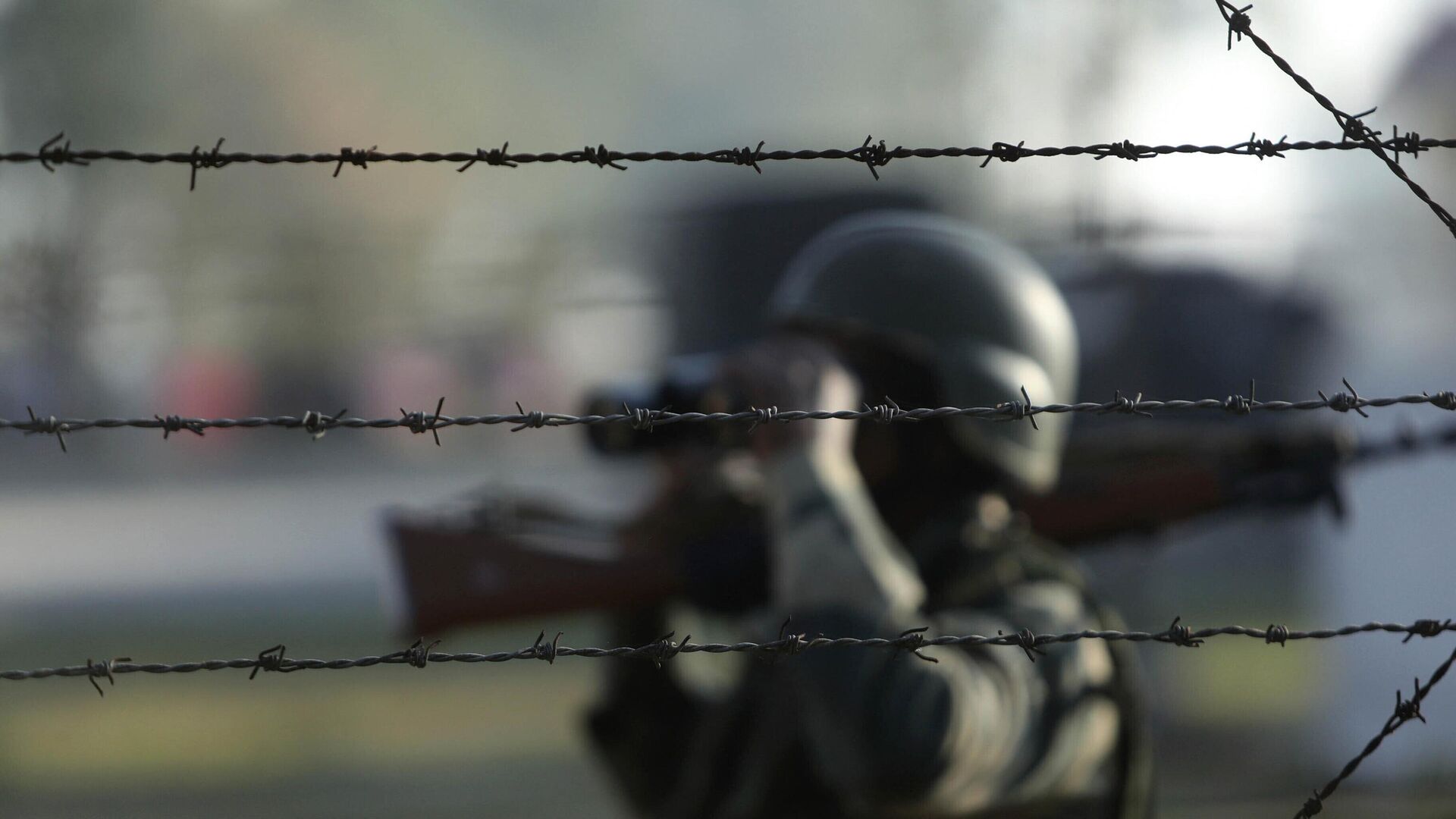https://sputniknews.in/20240711/militants-in-jk-try-to-evade-security-by-masquerading-as-local-groups-police-sources--7828068.html
Militants in J&K Try to Evade Security by Masquerading As Local Groups: Police Sources
Militants in J&K Try to Evade Security by Masquerading As Local Groups: Police Sources
Sputnik India
Security authorities in Jammu and Kashmir believe the current surge in militant violence is because of old militant networks based in Pakistan. Sputnik spoke to multiple security officials based in Jammu and Kashmir region who said that individuals who had travelled to Pakistan during the height of militancy in J&K are acting as guides for the freshly infiltrated militants in India.
2024-07-11T19:08+0530
2024-07-11T19:08+0530
2024-07-11T19:32+0530
jammu
pakistan
jammu and kashmir (j&k)
terrorism
bharatiya janata party (bjp)
pakistan army
india
indian army
kashmir valley
jammu & kashmir police
https://cdn1.img.sputniknews.in/img/07e8/07/0b/7833327_0:160:3072:1888_1920x0_80_0_0_0ff5e33380a29f74aa9e1ef7ae7c862e.jpg
Security officials in Jammu and Kashmir are attributing the current surge in militant violence to the revival of old militant networks based in Pakistan. Multiple security officials based in Jammu region firmly believe that individuals who had travelled to Pakistan during the height of militancy in J&K are acting as guides for the freshly infiltrated militants in the Jammu region, Sputnik found out.Several sources within the security establishment informed Sputnik that approximately 300 individuals from different districts of Jammu are suspected to be assisting foreign militants after infiltrating into the region from Pakistan. The theory is supperted by the fact that the new group of militants operating in Jammu province, many of whom are believed to be Pakistani nationals, have been using traditional routes.These conduits were being used by residents of J&K to cross over into Pakistan for arms training in the 1990s when an armed insurgency erupted in the region. The same routes were used to return to the region.Residual Militancy or Larger PlanAjai Sahni, executive director of the South Asia Terrorism Portal at the New Delhi-based Institute for Conflict Management, while speaking to Sputnik described the militancy as residual and said the recent attacks in Jammu not as a surge but a shift.According to the expert, post 2019 there has been a squeeze on militant and separatist activities in Kashmir: authorities have detained anyone, and everyone directly or indirectly, engaged in militancy. It is very difficult to operate in Kashmir, hence, militants shifted their focus to Jammu, Sahni said.Jammu and Kashmir Director General of Police R.R. Swain in a statement had expressed concern and stated anyone found supporting foreign militants will be booked under the stringent Enemy Actm which is mostly used to book foreigners in contravention to Indian law.However, a Jammu based functionary of the Rashtriya Swayamsevak Sangh (RSS), a socio-political fountainhead of the ruling Bhartiya Janata Party (BJP), highlighted what he termed as an insidious motive behind the new militants of Jammu.Old Routes, Old NetworksThe anti-India militancy erupted in the Kashmir region but spread over to all parts of the region including Jammu. Since 1989, India has consistently accused the Pakistani army of backing the insurgency in Jammu and Kashmir, a charge denied by Pakistan.Militancy in Jammu, owing to counter insurgency operations and its demography, was largely kept in check, and the region saw relative peace as compared to Kashmir province.However, over the last few years Jammu province has seen an uptick of militant violence in the form of attacks on army camps, check posts, civilian killings and attacks on religious pilgrims.According to the police, around 80 foreign militants are active in Jammu and Kashmir and sources told Sputnik more than 55 are active in Jammu province alone especially in the Pir Panjal Mountain range.As per the officials, the militants don't need satellites to communicate with each other, and most likely they use Pakistani SIM cards as the networks towards are located near the border areas of Pakistan.The FutureMeanwhile, the sources have stated that despite Pakistan apprehending leaders of banned terrorist groups such as the Lashkar-e-Taiba* and Jaish-e-Mohammad*, Pakistani militants are persisting with their efforts to destabilize Jammu.The officer added that it might take some time before the resurgence of militants in Jammu is controlled.The militants will not be able to survive in a place like Kashmir's Srinagar without being discovered by security agencies due to the small size of the city, the officer said. However, in Jammu, which has a large geographical spread, they can hit the security forces and disappear into the thick jungles, he concluded, ensuring that the forces will be able to overcome this challenge.** Lashkar-e-Taiba and Jaish-e-Mohammad are banned outfits in Russia and India.
jammu
pakistan
jammu and kashmir (j&k)
india
kashmir valley
Sputnik India
feedback.hindi@sputniknews.com
+74956456601
MIA „Rossiya Segodnya“
2024
Azaan Javaid
https://cdn1.img.sputniknews.in/img/07e6/0c/08/19280_0:0:1080:1080_100x100_80_0_0_d0f3f10ac6f30fb5b9e5e21a5e2536ea.jpg
Azaan Javaid
https://cdn1.img.sputniknews.in/img/07e6/0c/08/19280_0:0:1080:1080_100x100_80_0_0_d0f3f10ac6f30fb5b9e5e21a5e2536ea.jpg
News
en_IN
Sputnik India
feedback.hindi@sputniknews.com
+74956456601
MIA „Rossiya Segodnya“
Sputnik India
feedback.hindi@sputniknews.com
+74956456601
MIA „Rossiya Segodnya“
Azaan Javaid
https://cdn1.img.sputniknews.in/img/07e6/0c/08/19280_0:0:1080:1080_100x100_80_0_0_d0f3f10ac6f30fb5b9e5e21a5e2536ea.jpg
jammu and kashmir, militancy, terrorism, kashmir valley, pir panjal mountain, kathua attack, samba attack, poonch attack, rajouri attack, pakistan, pakistani army, lashkar-e-taiba, jaish e mohammad, india, indian army, bjp, rss
jammu and kashmir, militancy, terrorism, kashmir valley, pir panjal mountain, kathua attack, samba attack, poonch attack, rajouri attack, pakistan, pakistani army, lashkar-e-taiba, jaish e mohammad, india, indian army, bjp, rss
Militants in J&K Try to Evade Security by Masquerading As Local Groups: Police Sources
19:08 11.07.2024 (Updated: 19:32 11.07.2024) Five Indian Army personnel were killed on July 8 after militants ambushed a convoy in Jammu and Kashmir's Kathua district. The Jammu province is increasingly seen such attacks in the last two years.
Security officials in Jammu and Kashmir are attributing the current
surge in militant violence to the revival of old militant networks based in Pakistan.
Multiple security officials based in Jammu region firmly believe that individuals who had travelled to Pakistan during the height of militancy in J&K are acting as guides for the freshly infiltrated militants in the
Jammu region,
Sputnik found out.
Several sources within the security establishment informed
Sputnik that approximately 300 individuals from different districts of Jammu are suspected to be assisting foreign militants after infiltrating into the region from Pakistan.
The theory is supperted by the fact that the new group of militants operating in Jammu province, many of whom are believed to be Pakistani nationals, have been using traditional routes.
These conduits were being used by residents of J&K to cross over into Pakistan for arms training in the 1990s when an armed insurgency erupted in the region. The same routes were used to return to the region.
Residual Militancy or Larger Plan
Ajai Sahni, executive director of the South Asia Terrorism Portal at the New Delhi-based Institute for Conflict Management, while speaking to
Sputnik described the militancy as residual and said the recent attacks in Jammu not as a surge but a
shift.
According to the expert, post 2019 there has been a squeeze on militant and separatist activities in Kashmir: authorities have detained anyone, and everyone directly or indirectly, engaged in militancy. It is very difficult to operate in Kashmir, hence, militants shifted their focus to Jammu, Sahni said.
"There is another factor. After deployment of our troops to the eastern sector post 2020, security grid has thinned in Jammu to a certain degree. This is being seen as an opportunity by the militants, who are also using resentment among local population to further their objectives," Sahni added.
Jammu and Kashmir Director General of Police R.R. Swain in a statement had expressed concern and stated anyone found supporting foreign militants will be booked under the stringent Enemy Actm which is mostly used to book foreigners in contravention to Indian law.
However, a Jammu based functionary of the Rashtriya Swayamsevak Sangh (RSS), a socio-political fountainhead of the ruling Bhartiya Janata Party (BJP), highlighted what he termed as an
insidious motive behind the new militants of Jammu.
"We believe there is a clear attempt to trigger communal tensions in the Jammu region. In the 1990s, similar attacks took place on security forces and civilians, including those affiliated with the RSS and BJP. This time also some [of] our workers have been targeted especially in places like Kishtwar, but fortunately no communal tensions flared [up]," the functionary said.
The anti-India militancy erupted in the Kashmir region but spread over to all parts of the region including Jammu. Since 1989, India has consistently accused the Pakistani army of backing the insurgency in Jammu and Kashmir, a charge denied by Pakistan.
Militancy in
Jammu, owing to counter insurgency operations and its demography, was largely kept in check, and the region saw relative peace as compared to Kashmir province.
However, over the last few years Jammu province has seen an uptick of militant violence in the form of attacks on army camps, check posts, civilian killings and attacks on religious pilgrims.
"During the 1990s and 2000s, several locals who had crossed over for arms training in Pakistan never returned to fight back. Now they are acting as guides and network builders for Pakistani militants who are managing to infiltrate. The International Border and Line of Control is heavily guarded, but sometimes militants manage to cross over," a senior J&K police officer based in Jammu said.
According to the police, around 80 foreign militants are active in Jammu and Kashmir and sources told Sputnik more than 55 are active in Jammu province alone especially in the Pir Panjal Mountain range.
As per the officials, the militants don't need satellites to communicate with each other, and most likely they use Pakistani SIM cards as the networks towards are located near the border areas of Pakistan.
Meanwhile, the sources have stated that despite Pakistan apprehending leaders of banned terrorist groups such as the Lashkar-e-Taiba* and Jaish-e-Mohammad*, Pakistani militants are persisting with their efforts to destabilize Jammu.
"The militants want to retain the shape, size and color of indigenous militant groups by using named like Kashmir Tigers but in reality, they are battle hardened foreign fighters of LeT and Jaish," a senior police officer based in Kashmir said.
The officer added that it might take some time before the resurgence of militants in Jammu is controlled.
The militants will not be able to survive in a place like Kashmir's Srinagar without being discovered by security agencies due to the small size of the city, the officer said. However, in Jammu, which has a large geographical spread, they can hit the security forces and disappear into the thick jungles, he concluded, ensuring that the forces will be able to overcome this challenge.
** Lashkar-e-Taiba and Jaish-e-Mohammad are banned outfits in Russia and India.


